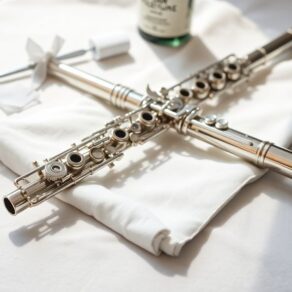To keep your flute in perfect condition, establish a regular cleaning routine. Wipe it down after each use and employ a cleaning rod with a cloth to remove moisture. Always check pads and corks for wear and replace them as needed. Handle your flute with care, avoiding pressure on the keys, and store it in a sturdy case. Prevent excess moisture by using silica gel packs and maintain a stable temperature away from direct sunlight. Schedule professional maintenance regularly and invest in quality accessories. With dedication, you'll enhance your flute's performance and longevity. There's so much more to explore!
Key Takeaways
- Clean your flute daily with a soft cloth and cleaning swab to prevent moisture buildup and enhance sound quality.
- Regularly inspect pads and corks for wear, replacing them as needed to maintain optimal sealing and sound production.
- Store your flute in a climate-controlled environment, avoiding direct sunlight and extreme temperatures to preserve its integrity.
- Use high-quality accessories like cleaning materials and durable cases to enhance your flute's performance and longevity.
- Schedule professional maintenance every few months for thorough cleaning, adjustments, and minor repairs to prevent larger issues.
Regular Cleaning Routine
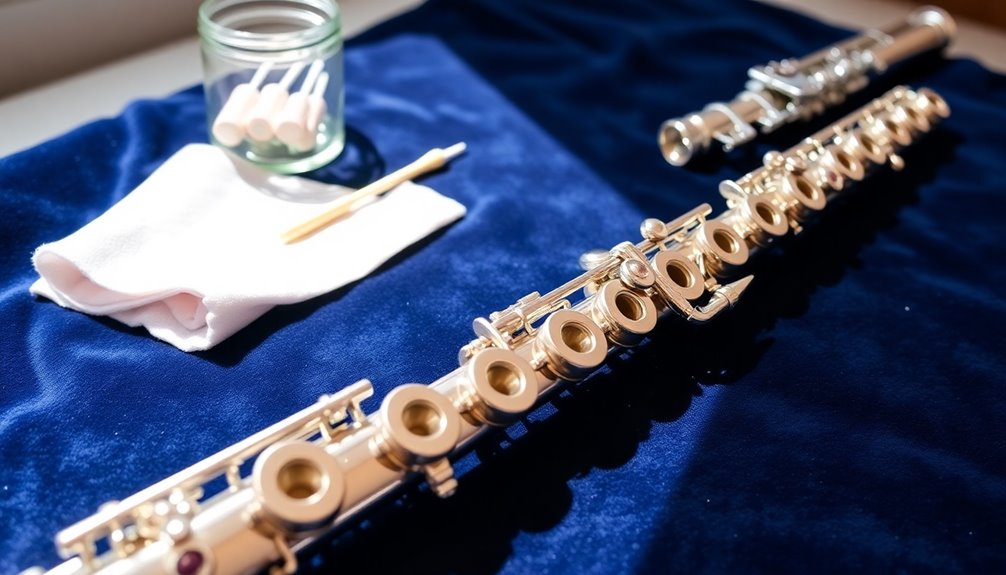
Keeping your flute in top shape requires a regular cleaning routine that guarantees its longevity and sound quality. Daily cleaning is essential to remove moisture and prevent buildup inside your instrument.
Start with a soft, lint-free cloth to wipe the exterior after each use, ensuring you handle it gently to avoid scratches.
For the interior, use a cleaning rod with a cloth attached to it. This tool helps you reach inside the flute's body and remove excess moisture that can lead to corrosion.
Make sure to use cleaning materials specifically designed for flutes; avoid anything abrasive that could damage the pads or finish. Regular cleaning not only prevents buildup of moisture but also enhances sound quality and intonation.
Incorporating this routine into your practice won't only enhance your flute's performance but also deepen your connection to your instrument.
You'll feel proud knowing you're taking the right steps to care for it, just like other musicians in your community.
Remember, consistency is key. By committing to this daily cleaning practice, you're investing in your flute's future and your own musical journey.
Proper Handling Techniques
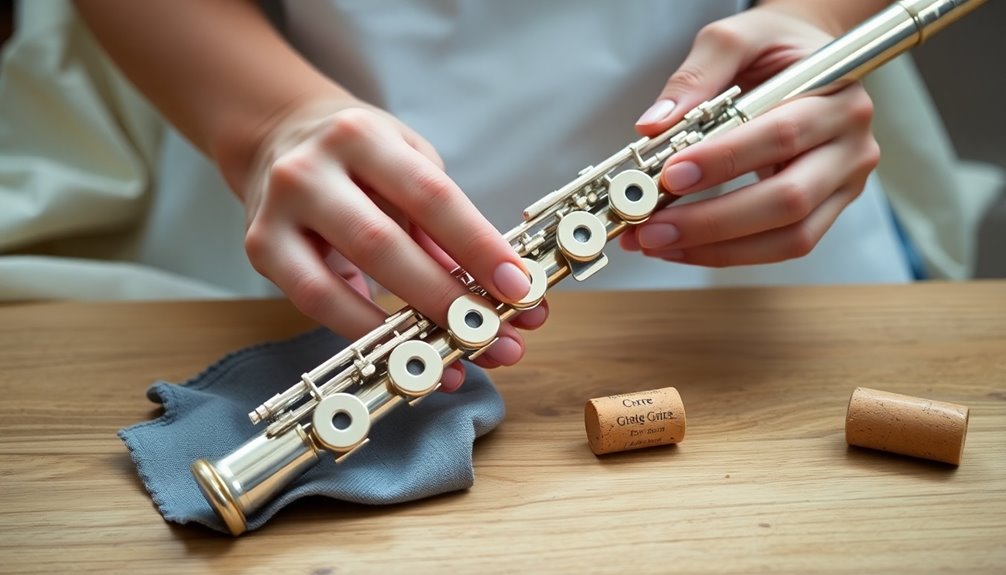
Proper handling techniques are essential for maintaining the integrity and sound quality of your flute. When you treat your instrument with care, you not only preserve its longevity but also enhance your playing experience.
Here are some key points to keep in mind:
- Use proper hand positioning: Hold your flute with relaxed hands, ensuring your fingers are curved and positioned correctly over the keys.
- Engage in mindful finger technique: Practice lifting and lowering your fingers gently to avoid unnecessary pressure on the pads.
- Avoid squeezing: Grip the flute firmly, but don't apply excess pressure that could misalign the keys.
- Keep your flute clean: Always wash your hands before playing to prevent oils or dirt from accumulating on the instrument.
- Store it properly: Use a case when your flute isn't in use to protect it from dust and accidental damage.
- Consider regular maintenance: Regular cleaning and inspections can prevent issues with tarnish and corrosion.
Use a Cleaning Swab
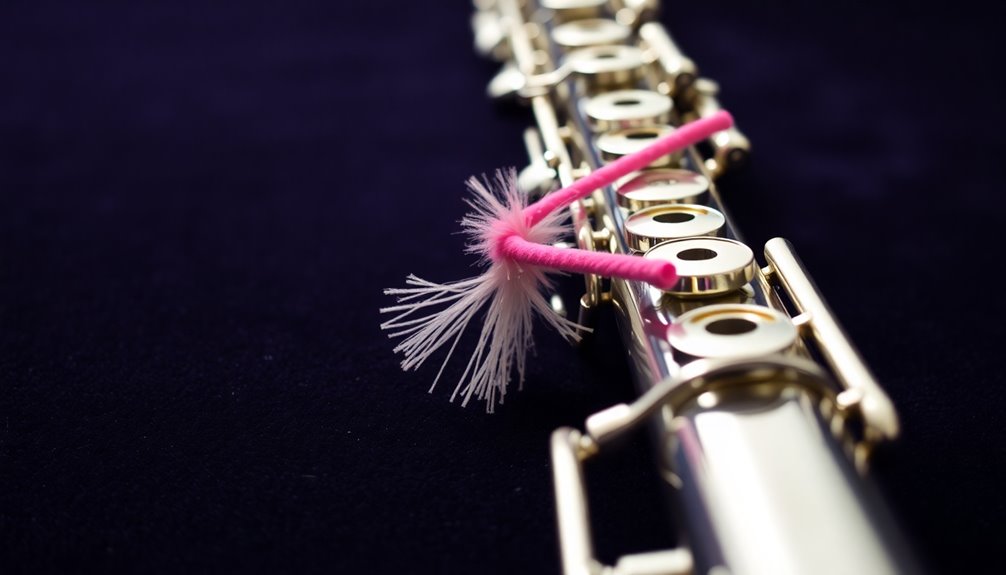
Using a cleaning swab regularly can greatly extend the life of your flute and maintain its sound quality. This simple yet effective tool is essential for every flutist.
When you finish playing, moisture can accumulate inside the instrument, which can lead to unwanted buildup and affect your tone. By incorporating proper swab techniques into your routine, you'll keep your flute in ideal condition.
Choose high-quality cleaning materials designed specifically for flutes. A soft, absorbent swab works best; it should easily glide through the body of the flute without causing any damage.
To use the swab, gently insert it into the flute and pull it through slowly, ensuring you cover the entire length. This action helps to absorb any lingering moisture, preventing corrosion and maintaining your instrument's integrity. Regular cleaning enhances the instrument's lifespan and performance, making it essential for all flutists.
Make it a habit to swab your flute after each practice session or performance. This small effort shows your commitment to your instrument and your music.
Avoid Excess Moisture

After swabbing your flute, it's important to take additional steps to prevent excess moisture from accumulating.
Moisture can lead to various issues, including corrosion and pad damage. By maintaining effective humidity control and promoting moisture absorption, you'll guarantee your instrument stays in top shape.
Here are some practical tips to help you manage moisture:
- Use a silica gel pack: These help absorb moisture in your flute case, keeping the environment dry.
- Store your flute in a cool, dry place: Avoid areas with high humidity, like bathrooms or kitchens.
- Regularly check the weather: On humid days, consider using a dehumidifier in your practice space.
- Keep your flute case closed: When not in use, this limits exposure to outside moisture.
- Clean regularly: Make cleaning a routine to remove any moisture that may linger after playing.
- Utilize proper cleaning tools: Investing in a quality flute cleaning kit ensures that you have the right materials to effectively manage moisture and maintain your instrument.
Check Pads and Corks
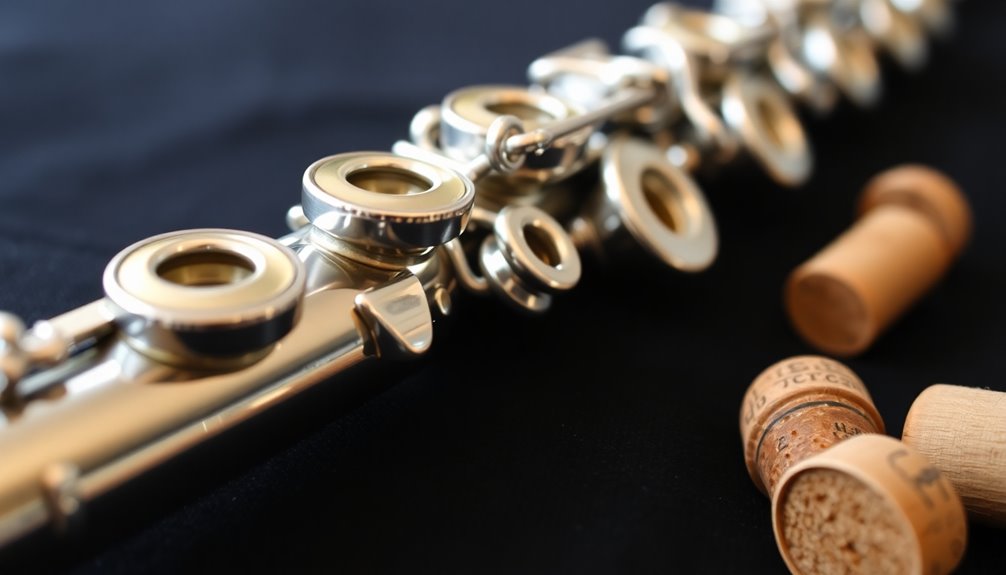
Regularly checking your pads and corks is crucial for maintaining your flute's performance and longevity. Over time, pads can wear out, leading to leaks that affect your sound quality. Don't hesitate to look for signs of damage, such as discoloration or cracks. If you notice any issues, consider pad replacement to guarantee that your flute remains in top shape.
Corks, too, need your attention. They play an important role in sealing certain sections of your flute, and proper cork maintenance can prevent air leaks. Check for any signs of wear and tear, and replace them if they begin to crumble or become too compressed. Additionally, using essential flute key oil can significantly improve the overall function of your flute's keys.
To help you stay on track with your maintenance, here's a quick reference table:
| Pad Check | Cork Check |
|---|---|
| Look for discoloration | Inspect for cracks |
| Check for softness | Guarantee proper sealing |
| Replace as needed | Replace if damaged |
Store in a Case
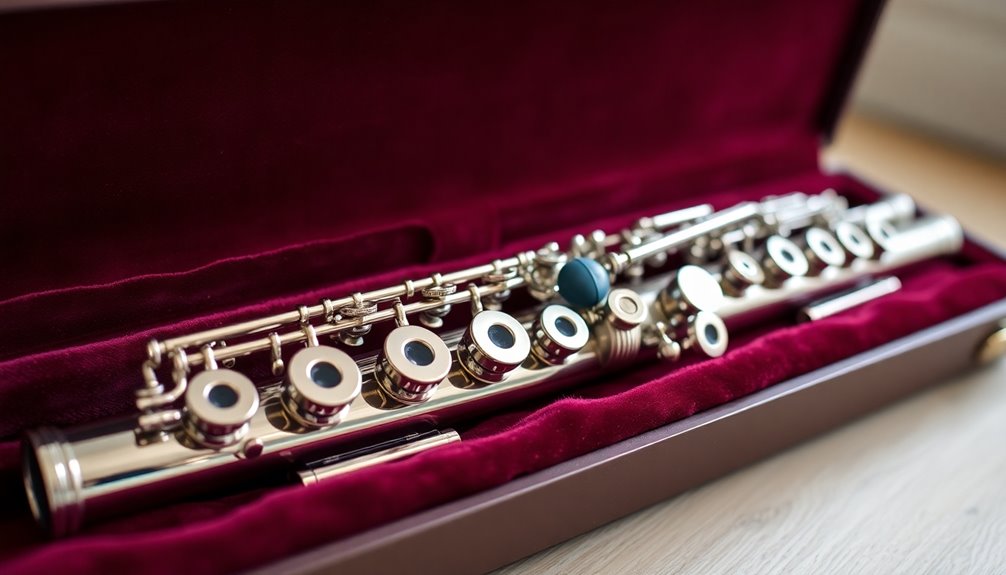
Even with well-maintained pads and corks, improper storage can lead to unnecessary damage to your flute. To keep your instrument in perfect condition, always store it in a case designed for protection. Choosing the right case materials can make a significant difference in safeguarding your flute from scratches, moisture, and dust.
Consider these key features when selecting a case:
- Durability: Look for hard-shell or padded options to withstand daily wear and tear.
- Lightweight: Portable cases are great for musicians on the go, making transportation easy.
- Secure Fit: Guarantee the case snugly holds your flute to prevent movement that can cause damage.
- Interior Padding: Soft linings protect delicate keys and finishes.
- Storage Compartments: Additional pockets for accessories like cleaning cloths and swabs keep everything organized.
Investing in a quality case not only protects your flute but also shows your commitment to maintaining its beauty and functionality. Additionally, selecting a case made from durable materials ensures your instrument remains safe during transport and storage.
Keep Away From Heat

When it comes to flute care, keeping your instrument away from heat sources is crucial for maintaining its integrity. Extreme temperatures can warp, crack, or damage the delicate materials of your flute. Be mindful of where you store it; direct sunlight, radiators, or even hot cars can lead to temperature fluctuations that harm your instrument.
Whenever you're playing, avoid positioning your flute near heating vents or other heat sources. If you're practicing in a warm environment, consider a fan or air conditioning to keep the temperature stable. Remember, your flute's metal components can expand and contract with heat, which may affect its tuning and overall performance. Regular inspections and cleaning of the headjoint for debris can also help mitigate the effects of heat on your flute.
Also, be cautious during transport. If you're traveling and the weather's warm, don't leave your case in the trunk of your car. Instead, keep it in a climate-controlled space.
By being proactive and protective, you're not just preserving your flute; you're also enhancing your playing experience.
Taking these steps helps guarantee that your flute remains in excellent condition, allowing you to enjoy every note and share your passion with others in your musical community.
Schedule Professional Maintenance
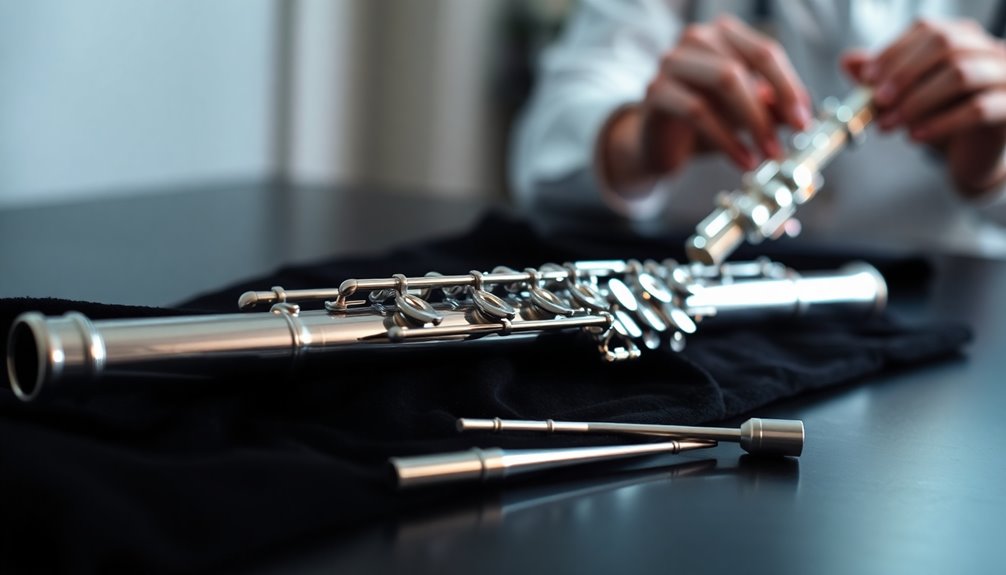
Maintaining your flute goes beyond keeping it away from heat; scheduling professional maintenance is key to guaranteeing it stays in prime condition. Regular visits to a skilled flute technician can help catch issues before they escalate, allowing you to enjoy your instrument to the fullest.
Establish a maintenance schedule that suits your playing frequency, whether it's every few months or once a year.
Consider these essential flute technician services:
- Thorough cleaning to remove dirt and grime
- Pad adjustments for ideal sealing
- Key alignment checks to guarantee smooth playability
- Cork and felt replacement to maintain sound quality
- Minor repairs to prevent future complications
Engaging with a qualified technician not only enhances your flute's performance, but also builds a supportive community. They can offer valuable insights tailored to your playing style and needs. Additionally, utilizing a comprehensive flute care kit can further streamline your maintenance routine.
Use Quality Accessories
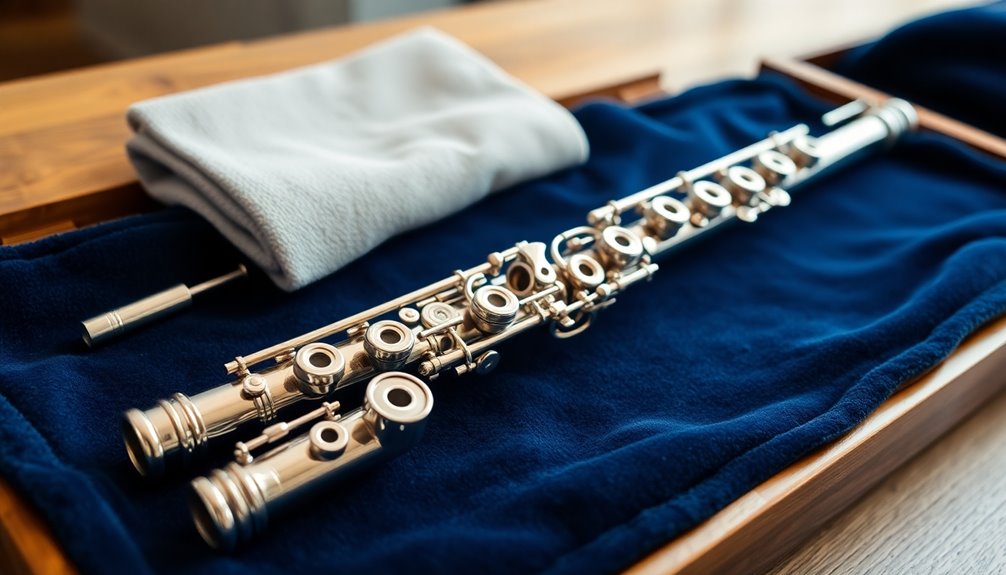
Using quality accessories can greatly enhance your flute-playing experience. When you invest in items made from quality materials, you not only boost your performance but also guarantee that your instrument remains in top condition. Accessories like cleaning cloths, pads, and cases are essential, and choosing reputable accessory brands can make all the difference.
For example, a well-made cleaning cloth can effectively remove moisture and dirt without scratching your flute, while a durable case protects your instrument from accidental damage. Quality accessories demonstrate your commitment to your craft and provide the support you need to develop as a musician.
Don't skimp on these essentials; consider upgrading your accessories to reflect your dedication. You'll find that using reliable brands fosters a sense of community among fellow flutists who share similar values.
By choosing quality accessories, you're not just enhancing your experience—you're joining a collective of musicians who prioritize excellence. Consider investing in essential flute care products that can further ensure your instrument's longevity.
Take pride in your choices, and embrace the journey of becoming a better flutist. With quality accessories by your side, you'll feel more confident and connected to your music.
Maintain Consistent Temperature
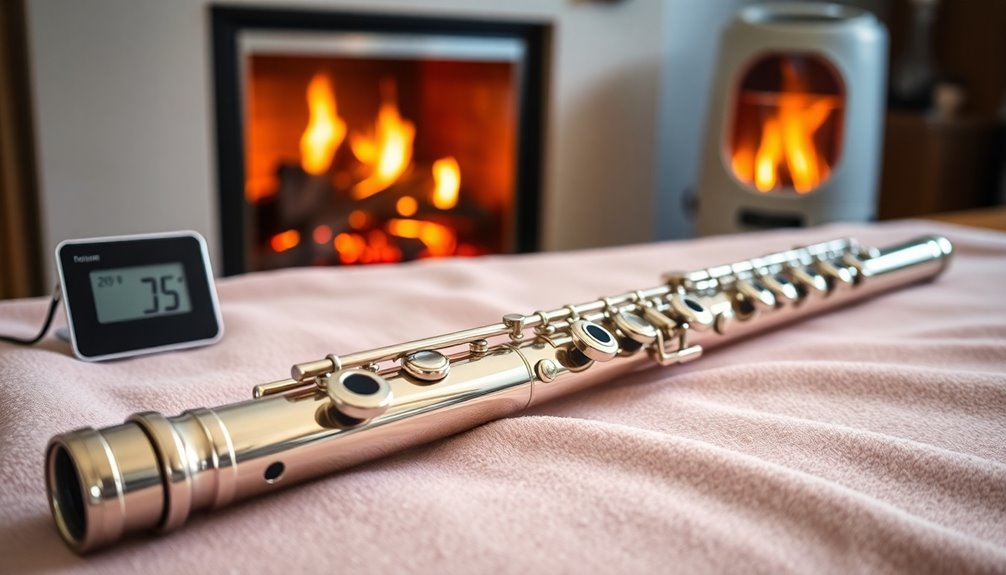
Flutes thrive in stable environments, so keeping your instrument at a consistent temperature is essential for its performance.
Temperature fluctuations can lead to issues like warping and pads losing their shape, which directly impacts your sound quality. By maintaining a stable temperature, you're not just protecting your flute; you're also nurturing your musical journey.
Here are some practical tips to help you keep your flute in the best condition:
- Store your flute in a climate-controlled area. Avoid attics or basements where temperature and humidity levels vary greatly.
- Use a case with insulation. This can help shield your flute from sudden changes in temperature.
- Avoid direct sunlight. Leaving your flute in a sunny spot can cause rapid temperature changes and damage.
- Let your flute acclimate. If you move between different environments, give your flute some time to adjust before playing it.
- Monitor humidity levels. Aim for a relative humidity of around 40-60% to keep your pads and mechanism in top shape. Additionally, using a room humidifier during cold months can help maintain optimal moisture levels for your flute.
Frequently Asked Questions
How Often Should I Replace My Flute's Pads?
You should consider replacing your flute's pads every 2 to 5 years, depending on their pad lifespan and how often you play.
If you notice any leaks or diminished tone quality, it's a sign you need a pad replacement sooner.
Regular maintenance keeps your flute performing at its best, so don't hesitate to consult a professional.
Taking care of your instrument guarantees it stays part of your musical journey for years to come.
Can I Use Vinegar to Clean My Flute?
Imagine you've just finished a long practice session, and your flute looks tarnished. You might wonder if vinegar can help.
While vinegar has benefits like cutting grease, it's not the best choice for cleaning your flute. It can damage pads and metal.
Instead, consider using gentle cleaning alternatives like a microfiber cloth or specialized flute cleaner.
Keeping your instrument in top shape guarantees you can keep playing and enjoying the music you love!
What Type of Case Is Best for My Flute?
When choosing the best case for your flute, consider a hard shell case for maximum protection against bumps and drops.
These cases offer durability and secure your instrument well.
If you prefer something lighter, a padded case might be your choice; it provides decent protection while being more portable.
Both options keep your flute safe, so pick one that fits your lifestyle and makes you feel confident carrying your instrument wherever you go.
How Do I Know if My Flute Needs Professional Maintenance?
To know if your flute needs professional maintenance, watch for signs like sticky keys, unusual sounds, or difficulty playing.
If you notice any changes in tone or intonation, it's time for a professional inspection. Regular check-ups help guarantee your instrument performs at its best and can prevent bigger issues down the line.
Trust your instincts; your flute deserves the best care, and you'll feel more confident in your playing!
Can Temperature Changes Affect My Flute's Performance?
You might think your flute can handle anything, but temperature extremes and humidity effects can really impact its performance.
Rapid changes can cause key pads to swell or shrink, leading to leaks. It's crucial to keep your instrument in a stable environment.
If you notice any issues, don't hesitate to seek help. Taking care of your flute guarantees it stays in top shape, so you can enjoy every note without worry!
Conclusion
By following these tips, you can keep your flute in top shape and guarantee it sounds its best for years to come. Remember, a little care goes a long way—don't you want to enjoy playing your instrument without worry? Regular maintenance and proper handling can prevent costly repairs down the line. So, take pride in your flute; it's not just an instrument, but a companion in your musical journey. Happy playing!

